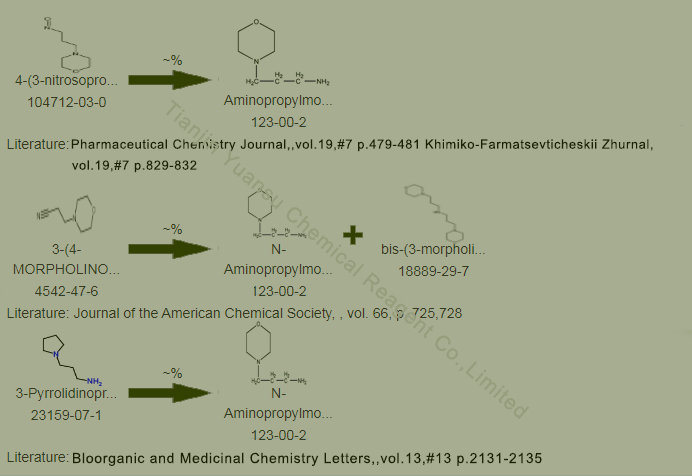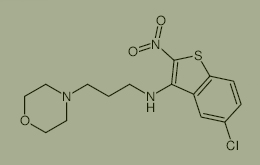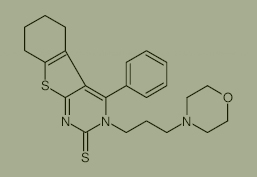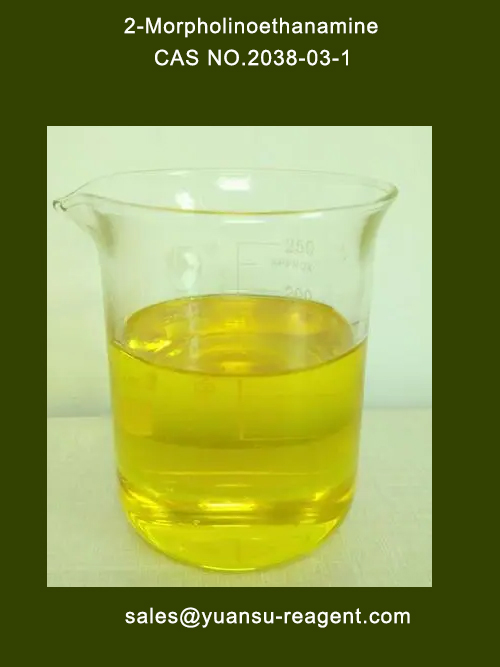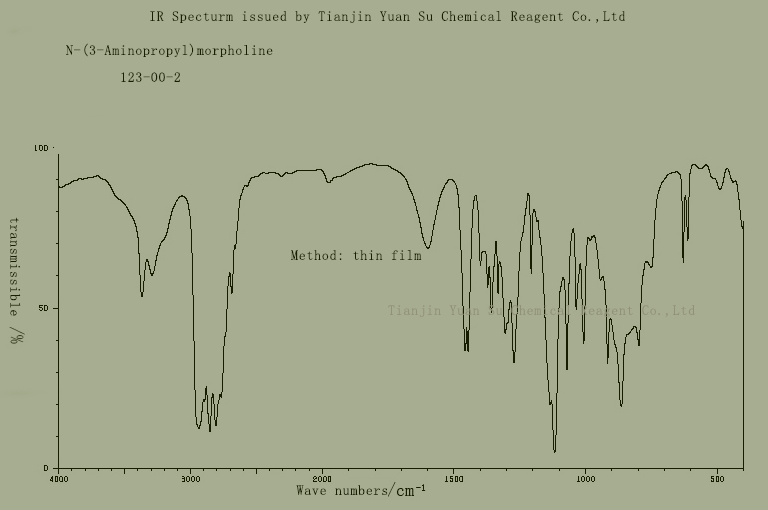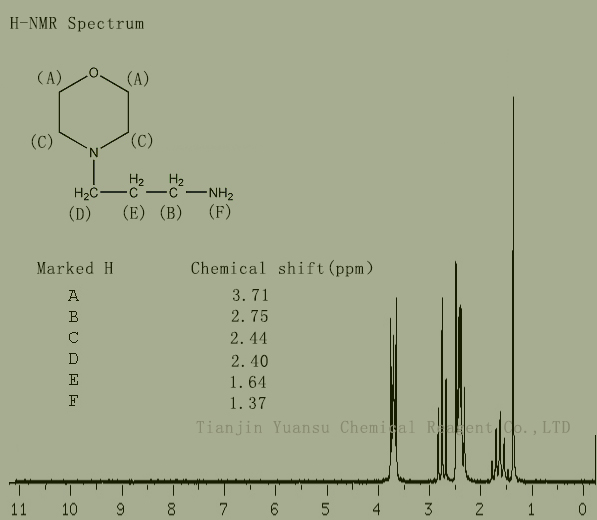N-(3-Aminopropyl)morpholine
What is N-(3-Aminopropyl)morpholine, cas no:123-00-2,a producer telling you the result.
CAS NO.123-00-2
If you need the products .Please send your inquiry to us through e-mail: sales@yuansu-reagent.com
To begin with, let us tell you what is the basic information of N-(3-Aminopropyl)morpholine ?
|
Molecular Formula |
C7H16N2O |
Molecular Weight |
144.215 |
|
Density |
1.0±0.1 g/cm3 |
Boiling Point |
227.8±25.0 °C at 760 mmHg |
|
Flash Point |
98.9±0.0 °C |
Melting Point |
−15 °C(lit.) |
Like many stuff, it has many synonyms as follows
|
EINECS 204-590-2 |
|
MFCD00006184 |
|
3-Morpholinopropylamine |
|
4-Morpholinepropanamine |
|
γ-Morpholinopropylamine |
|
4-(γ-Aminopropyl)morpholine |
|
3-morpholin-4-ylpropan-1-amine |
|
3-Morpholinopropan-1-amine |
|
3-(4-Morpholinyl)-1-propanamine |
|
3-(morpholin-4-yl)propan-1-amine |
First, the chemical is very special, some technical indexes as below
If you need the products .Please send your inquiry to us through e-mail: sales@yuansu-reagent.com
PubChem Number: 24891218
Physical property data
Currently unavailable
1. Skin/Eye Irritation: Rabbit Skin Irritation Test: 10mg/24h has a severe irritant effect on the skin.
Rabbit skin irritation test: 500mg has a serious irritating effect on the skin.
Rabbit eye standard Dreze staining experiment: 250ug/24H has a serious irritating effect on the eyes.
2. Acute toxicity: Rat oral LD50: 3560mg/kg
Rabbit skin LD50: 1230uL/kg
Ecological data
Currently unavailable
Molecular structure data
5、 Molecular property data:
1. Molar refractive index: 41.11
2. Molar volume (m3/mol): 146.3
3. Waiting ratio (90.2K): 357.1
4. Surface tension (dyne/cm): 35.5
5. Polarization rate (10-24cm3): 16.29
Calculate chemical data
1. Reference value for hydrophobic parameter calculation (XlogP): -0.7
2. Number of hydrogen bond donors: 1
3. Number of hydrogen bond acceptors: 3
4. Number of rotatable chemical bonds: 3
5. Number of tautomers: None
6. Topological molecular polarity surface area 38.5
7. Number of heavy atoms: 10
8. Surface charge: 0
9. Complexity: 81.7
10. Number of isotopic atoms: 0
11. Determine the number of atomic stereocenters: 0
12. Uncertain number of atomic stereocenters: 0
13. Determine the number of chemical bond stereocenters: 0
14. Number of uncertain chemical bond stereocenters: 0
15. Number of covalent bond units: 1
Second, the Synthetic Route we will recommend is the most important for your reference?
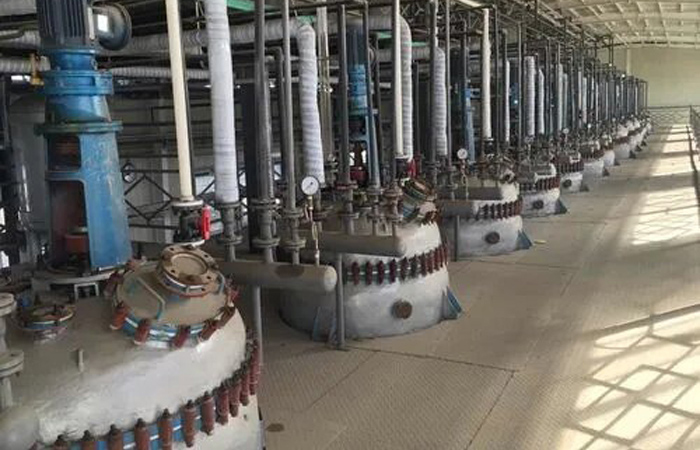
First, synthesis line of N-(3-Aminopropyl)morpholine CAS NO.123-00-2 as follows
Main production methods:
N-aminopropylmorpholine can be obtained through the aminolysis reaction between 1,3-propanediamine and morpholine. The specific preparation method also includes steps such as selective reduction and catalytic hydrogenation.
Third, what is the usage of N-(3-Aminopropyl)morpholine CAS NO.123-00-2 ? pleas see below
If you need the products .Please send your inquiry to us through e-mail:sales@yuansu-reagent.com
Main usages:
Used for the synthesis of 5-chloro-N-(3-morpholin-4-ylpropyl)-2-nitro-benzothiophen-3-amine Cas no. 149338-22-7
Used for the synthesis of N-[(2-chlorophenyl)methyl]-3-morpholin-4-ylpropan-1-amine Cas no. 107922-87-2
Used for the synthesis of 3-(3-morpholin-4-ylpropyl)-4-phenyl-5,6,7,8-tetrahydro-[1]benzothiolo[2,3-d]pyrimidine-2-thione Cas no. 128352-85-2
Besides Safety Information of N-(3-Aminopropyl)morpholine CAS NO.123-00-2 is also important when handling it
|
Hazard Codes |
Xi |
|
WGK Germany |
3 |
|
H.S.Code: |
|
|
TSCA |
Yes |
|
HazardClass |
IRRITANT |
What is the appearance of N-(3-Aminopropyl)morpholine CAS NO.123-00-2? Please see the picture of N-(3-Aminopropyl)morpholine CAS NO.123-00-2, below
If you need the products .Please send your inquiry to us through e-mail: sales@yuansu-reagent.com
Specification of N-(3-Aminopropyl)morpholine CAS NO.123-00-2, is below
Apperance:colorless to light yellow liquid
Assay: 99 min by GC
IR identity: conform
IR picture of N-(3-Aminopropyl)morpholine CAS NO.123-00-2 is as follows,
HNMR Spectrum picture of N-(3-Aminopropyl)morpholine CAS NO.123-00-2 is as follows,
Reference of Article cited for your reference below,
(1)
PMID: 18454143
Publication Date: 2008
Publication Name: Nature Chemical Biology
(2)
Publication Date: 2018
Publication Name: Russian Journal of General Chemistry
(3)
Publication Date: 2004
Publication Name: Transition Metal Chemistry

